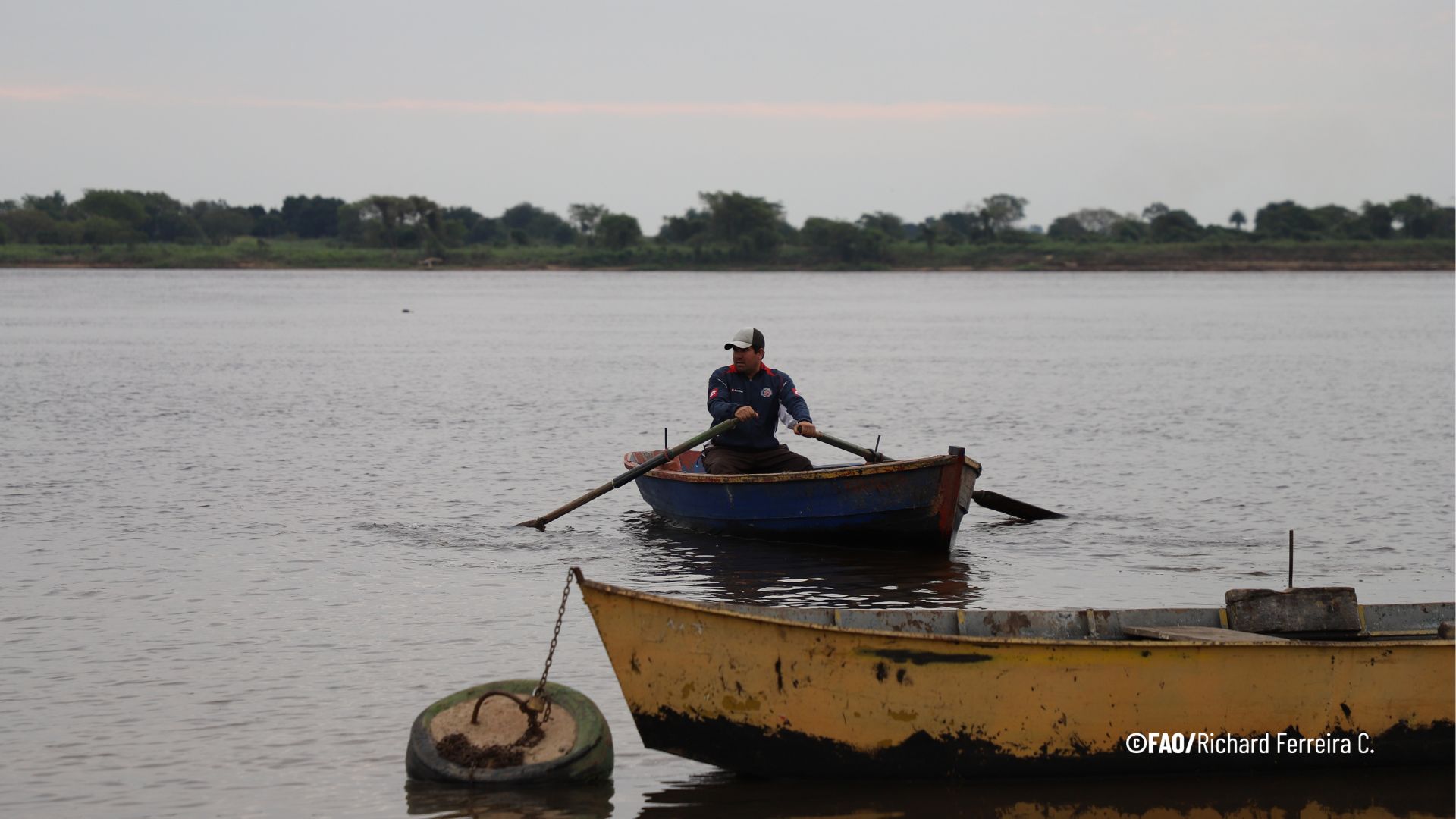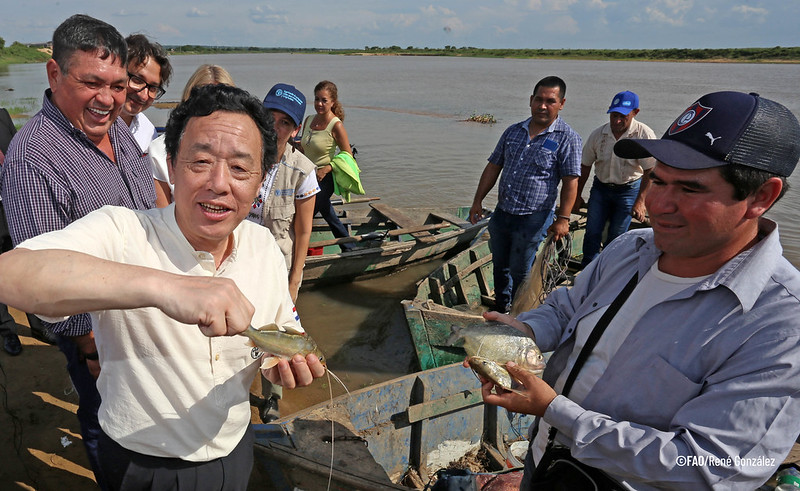FAO Support to Strengthen the Fishers' Assistance Programme in Paraguay
Story of Walberto Valdez: "I have been fishing for 20 years to support my family".

On the shores of the Paraguay River, in the city of Villeta, just a few meters from his house, lie the two boats that Walberto Valdez (37) uses daily to venture out into the waters in search of catches. Like hundreds of other fishers in the area, he goes out each day, hoping to catch enough fish to sell and provide for his family. His main concern now is his one-and-a-half-year-old daughter. "You have to work hard to support your family, especially your children, and we fishers do that every day," he says.
Villeta, located just over 41 kilometres from Asunción, the capital of Paraguay, is known as the industrial and port city of the Central Department. The Paraguay River surrounds it, one of the largest in the country. Despite being a fishing area, Walberto mentions that fishing has not been as good in recent years.
"Before, there was a lot of fishing, now almost nothing," he recalls when he used to help his father, who was also a fisher. "I've been fishing since I was a boy, but for the last 20 years, I've been fishing to support my family," he says, expressing concern about the current situation, which he describes as not good and not only during the closed fishing season but throughout the year. Walberto also emphasizes the need for extended state support for fishers, not just through subsidies but also through programs that would allow them to diversify what they do. He mentions initiatives like fish farming tanks and the River Corridor project with FAO technical support.
River Corridor
The "River Corridor" project is an initiative in which five municipalities bordering the Paraguay River (Villeta, Alberdi, Villa Oliva, Villa Franca, and Pilar) participated as part of the social protection system "Vamos!" During FAO's visit to Paraguay in January 2023, the FAO Director-General QU Dongyu had the opportunity to learn about the initiative and visit Villeta. He praised the mayors for promoting the River Corridor Initiative, which exemplifies the implementation of the Hand-in-Hand Initiative in Paraguay.
The River Corridor Initiative, targeting 80,000 inhabitants, aims to develop the tourism and fisheries sectors, industrial potential, and cultural heritage, as well as economic and productive inclusion and labour insertion within the framework of the Social Protection System in Paraguay. FAO Director-General QU Dongyu emphasized FAO's role in supporting sustainable investments, based on a geospatial and market-based approach to agricultural and food systems.
"FAO's role and function is to support, facilitate and stimulate meaningful and sustainable investments by contributing to the elaboration of investment plans based on a geospatial and socio-economic analysis and a market-oriented agri-food systems approach, elements that are the distinctive feature of this Initiative," said FAO Director-General QU Dongyu .

Associations and State Subsidies
Walberto is a member of the Asociación de Pescadores Espineleros de Villeta, one of more than 140 organized fishers' associations in the country registered with the Ministry of Environment and Sustainable Development (MADES) and part of the group of associations that receive monetary assistance from the government during each closed fishing season. Monetary assistance to fishers during the closed season is established by the Fishers' Assistance Programme, created by a presidential decree in 2007.
The subsidy payment, one of the main actions determined in the Programme, is made once a year, and according to data from 2022, it is estimated to reach more than 4,000 families located in 54 districts in 13 departments of the country. "The State, through the Fishers' Assistance Programme, pays a subsidy as part of Social Protection. In addition, work is being done to redesign the programme. We will have a diagnosis, and from there we will aim to provide more comprehensive attention to the sector," explains Mirtha Pereira, director of the National Territory Fishers' Assistance Programme of the Ministry of Social Development (MDS).
Redesigning the programme
While the closed-season subsidy is an action that supports fishing families for a certain period, there is a pressing need to improve attention and broaden the economic income alternatives to achieve food and nutritional security.
"What is being done now with FAO's technical support (through the SocPro4Fish project) is the redesign of the programme and from there to see how to work in coordination with other institutions that have the same objective as ours, to strengthen it with an integral system," describes the Programme Director. She also explains that strengthening institutional capacity would allow for improved attention to the fisheries sector, but she affirms that coordinated work is necessary. "For any work you want to do, you need to involve the other institutions with similar objectives to the Ministry," she says.
She adds that it is necessary to work, for example, with MADES, the Ministry of Agriculture and Livestock, and SENACSA. Taxation and social security agencies are also needed. The government programme also includes attention to Indigenous communities, in which the work is more complex because this sector is in extreme poverty and customs and traditions must be respected for each action to be developed. "In recent years, more indigenous communities are registering. Indigenous and non-indigenous fishers face different realities, so it is necessary to design strategies for both sectors," she said.
FAO support
According to the 2022 edition of FAO's "State of World Fisheries and Aquaculture" report, global fisheries and aquaculture production is at an all-time high, and the sector will play an increasingly important role in food supply and nutrition in the future. However, Walberto's comments do not allow us to think of an improvement in the country unless the necessary measures are taken to strengthen the sector.
"The FAO in Paraguay, through the Social Protection programme for the fisheries and aquaculture sector (called SocPro4Fish), has been working with the Ministry of Social Development to strengthen the technical capacities of institutions and strategic actors linked to the fisheries and social protection sector. Progress has been made in analyzing the coverage of social protection programmes in Paraguay among artisanal fishing communities, assessing the vulnerabilities and dangers of small-scale fishers and their barriers to accessing the Fisher's Assistance Programme and other social protection programmes. An analysis of opportunities for productive inclusion has also been carried out, with a focus on the viability of fishery products in public procurement processes, and recommendations on how to strengthen the interoperability of the fisher's registry in Paraguay. All the above supplies input to propose and support the redesign of the Fisher's Assistance Programme, from a Social Protection perspective", says Alcira Quintana, FAO specialist in Social Protection.
Quintana explains that, according to the institutional guidelines, the aim is to strengthen the coordination of the entities that work with fisheries. "We believe that with the commitment shown, it will be possible to achieve this objective in the short and medium term," she said.
FAO's SocPro4Fish project, funded by the Norwegian Agency for Development Cooperation, is working on extending social protection to fishers in Paraguay. It aims to identify the barriers to accessing social protection given the informality and seasonality of the sector. The project is conducting a diagnosis of the assistance programme for fishers that provides financial compensation during fishery closures, aiming to support the government in re-designing and improving the programme. The SocPro4Fish project is also supporting the government in the evaluation of the registry systems in the country to enhance their interoperability and the development of plans of action to diversify fishers’ livelihoods during closed seasons.
Walberto, like thousands of fishers in Paraguay, knows that the situation will become increasingly more complicated. As a way out of his problem, he plans to look for alternatives other than fishing, in case he does not manage to strengthen his income in this area. But he is hopeful that things will improve. "It is undeniable that we must see how to strengthen institutional work to improve the situation of families who depend on fishing, always within the framework of Social Protection," Alcira Quintana, the FAO specialist, stressed.
